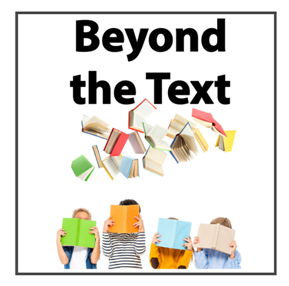
What is an interactive book? You may have thoughts of pop-up or lift-a-flap books. Yes, most definitely, these are interactive books. But many books encourage interaction through wordplay, thoughtful questions, or activities related to the text. Some books provide personal interaction by helping children process their own experiences by providing profound character development and shared situations. There is a lot for a reader or listener to explore beyond the text. Whenever reading a book to a child or student, continue the book's magic by looking at ways for the text to provide interesting interaction.From recipes to rethinking problems to QR codes, this month's notable review titles provide a variety of ways children and teens can interact with books.
Subscribe to ChildrensLit Now Newsletter
In case, if you have missed our previous issue.
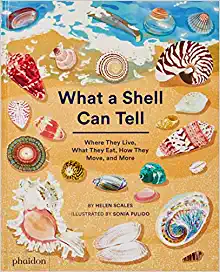
This is a rich, detailed text that speaks of shells and their diversity, development, structure, importance, evolution, and more. Helen Scales, a marine biologist, has successfully presented what shells are and the world they live in. Whether talking about gastropods or bivalves, this book is designed to assist the reader in identifying a multitude of shells from around the world. Readers will find that all shells are not alike and that even though they may look the same, no design is identical. Readers who are not familiar with shells and the mollusks that live within them will walk away with both knowledge and a sense of wonder. In the vast world of shells, it is astounding how these fantastic creatures and their strong homes are designed to help them survive the most extreme temperatures and environmental conditions. Scales and Pulido do an excellent job of presenting the anatomy and architectural design of shells, the animals that depend on them, the effect they have on the ecosystem, and the role they play in the history of planet Earth. The book is presented in a question-and-answer format, with pages full of vibrant and colorful illustrations and diagrams that highlight important information and concepts. It is designed in a large print form that makes the reading experience more accessible and fun. This is a book that will enrich lessons, provoke scientific learning and environmental thinking, and be a wonderful resource in any library.
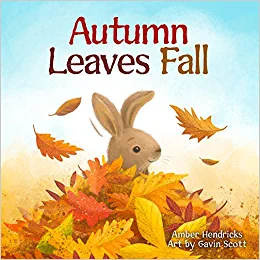
A wonderful book that brings in the fall! In the story, various forest animals romp through the forest, with the book detailing their journey in a rhyming and poetic fashion, as fall sets in and green leaves turn to all kinds of colors and fall by the end of the book. The sturdy cardboard of the book and the eye-catching pictures make this a wonderful book for your young children and young learners in the elementary classroom. The rhyming text is perfect for practicing keeping a steady beat, as well as vocal exploration in music class, with voices going up and down to follow the text in the book. Another plus is that children can act out all of the sounds in the book as they read it, which will make for a fun storytime or afternoon movement break. This is a great book to use for lessons at the beginning of the school year or in October when all of the leaves have turned colors.
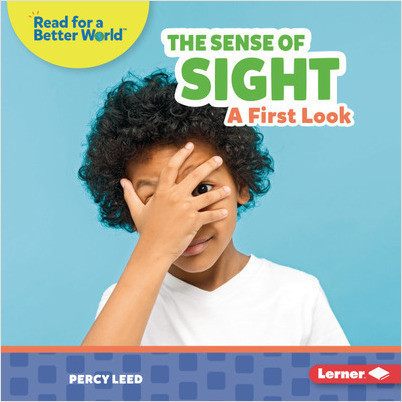
"I see many things." - this is a simple line but one of the most powerful pages within this book. The image on this page is that of a child with glasses. The author's intentional inclusion of a support allows students to potentially question what they notice differently and start a conversation about the need for support to make life experiences better. Although it was not directly included, an adult reader might prompt this discussion with the reader. The text does a great job reinforcing many early learning skills such as shapes and colors. With this inclusion, the items are embedded within an existing context and not isolated content review. This can also help with building background knowledge for learners. This text is part of a 5-book series presenting early learners with information to build onto their existing knowledge about the senses. All five texts maintain a consistent format with components including diverse representation of the people, discussion questions (before, during, and after reading) to help early learners make meaning from the text, and information to guide use by non-educators, including social-emotional connections and guiding actions to use when reading the text. In addition, these texts have some pages with a repetitive format which allow the earliest readers to use the pictures and start to read the text. Recommended for early readers.
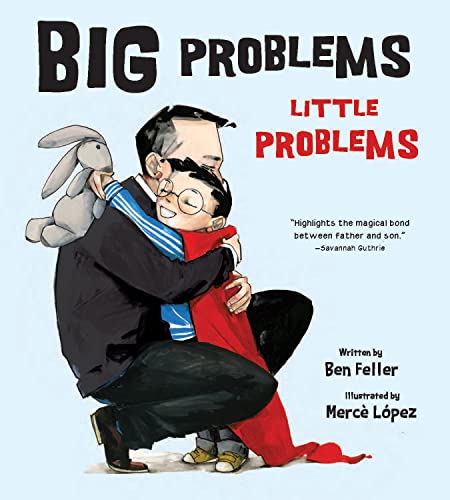
As Dad ties his tie, Sam grows frustrated with his zipper and declares a big problem. Dad helps Sam and then asks if it was a big problem or a little problem. Though Sam does not quite know how that one word can make such a difference yet, he feels better. Dad explains that with a little perspective, zippers are little problems—even if they feel like big problems for a moment. Sam and Dad hug before setting off for the day. The next morning, Sam's superhero cape is nowhere to be seen, but he agrees with Dad that a missing cape is just a little problem. Dad shares that he feels frustrated sometimes, too, and shows Sam how to take three deep breaths. The following morning comes, and Sam has found his superhero cape, but running so fast to tell Dad, Sam spills Dad's coffee all over his important papers. Dad declares a big problem. This time, Sam helps him see that the big problem breaks down into manageable little problems. After the mess is cleaned up, Sam is about to set off for school and Dad for work when Sam declares a big problem—they forgot their hug! Accompanied by colorful and expressive illustrations, the text is appropriately written for a young audience's comprehension level with a few new words (perspective, patience, and frustrated) and the difference between big and little problems is well explained for a child's understanding. Sam and Dad don't just present problems but also solutions, and the nice shift at the end from Dad telling Sam to rethink his problems to Sam giving Dad his grounding check shows that children can have ownership of their emotions and perspective too. A child-friendly, social-emotional book aimed at a father-son bond that is perfect for the bookshelf.
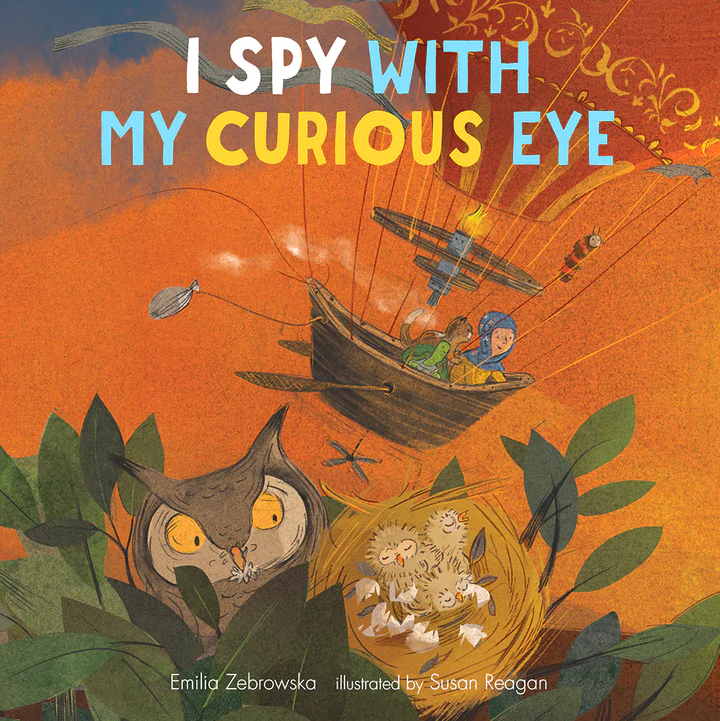
Curiosity, wonder, and investigation are at the core of this splendid and non-traditional I Spy book. You and your little one get to float through these gorgeous illustrations in an inventive hot air balloon, picking up forest friends along the way and using the clues to uncover more wonders of the forest and surrounding areas. This book is filled with lovely, simple text yet gloriously rich in vocabulary for young ones. Bold adjectives jump out at the turn of a page, making this a wonderful book for pre-readers. As with any good picture book, I Spy With My Curious Eye invites and generates more questions and interests as you read and welcomes the idea of grabbing a picnic and taking this sturdy book outside to explore. What a splendid asset to any toddler room, preschool classroom, or outdoor library. This would make a lovely gift for anyone who values cultivating an ever-questioning scientific and imaginative mind.
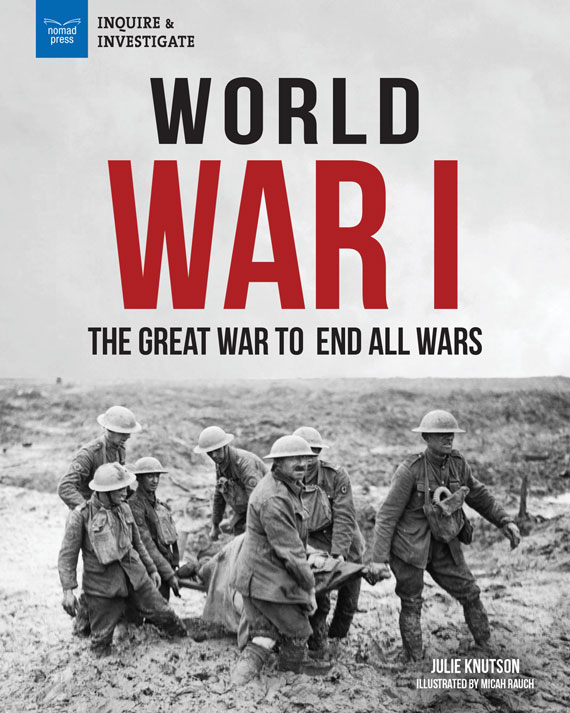
Did you know that during WWI, more than 1 million women entered the workforce to fill vacated positions due to the war? This informational text goes beyond the main details of the war to the inclusion of lesser-known wartime information, such as the value of women during the war. It details salient events but from the lens of the impact of the war on people, factors and causes of people joining the war, and the general expectations of individuals. The focus on people includes primary sources such as a picture of a barber working during the war….yes, they were important during this time! The 7-chapter text integrates elements of the Social Studies C3 framework dimensions, including gathering and evaluating evidence, questions, and investigations. This is done creatively through the inclusion of many primary source documents, including posters and quotes. It also presents multiple opportunities for reader engagement, such as QR codes to explore supplemental information, comic strips at the beginning of each chapter, research ideas, vocabulary discussions, and connections to the world. Additionally, the text appropriately integrates text features such as a timeline of the war and a map highlighting locations of the war. These help to support the reader in making meaning from the text. Outside of these strengths, the vocabulary strategies and text connections are the same for each chapter without differentiation to engage the reader in a different way.
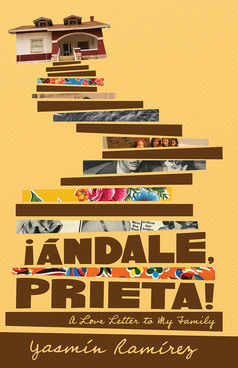
Ramirez's debut is a captivating memoir from beginning to end; it is raw, relatable, warm, unapologetic, and educational. Readers encounter the author's struggle with love, identity, and family, as well as her rich discoveries of womanhood, diversity, and culture. Mirroring the cover illustration, Ramirez's life is filled with uphill steps that get steeper as the story progresses. Yet despite all the heavy, excruciating, sharp, and overwhelming experiences, the finale is resilient, loving, and familiar. This memoir dances between Ramirez's life and that of her grandmother, Ita. Ita, an important figure in her life, gives Ramirez the name Prieta and teaches her valuable survival lessons, including boxing. Ramirez grows up with an absent father and straddling two worlds, Mexican and American. A native of El Paso, Texas, she experiences an all-American childhood and young adulthood, with all its pop culture charm, rebellion, and disappointments. Later, she moves to Dallas for college, where she encounters racism, ageism, and other difficulties. Ultimately, she finds connections, in relation to her grandmother and cancer survival. The book closes with a brief history of Ramirez's ancestors and how their lives were shaped in Texas. The hard-lived stories found within are not afraid to shine through, even as the author shares the heaviness of being a woman, single mother, survivor, and historian. This memoir salutes love, family, traditions, biculturalism, bilingualism, and the beauty of dark skin tones. It is a raw and vivid interpretation of Ramirez's life, intertwined with Ita's influences. In an interesting technique, she invites readers to interact with the text by providing a music playlist that recounts the feelings, emotions, and era of the narratives. As an added bonus, Ita's authentic homemade recipes are included to further enrich the experience. This is a must read!
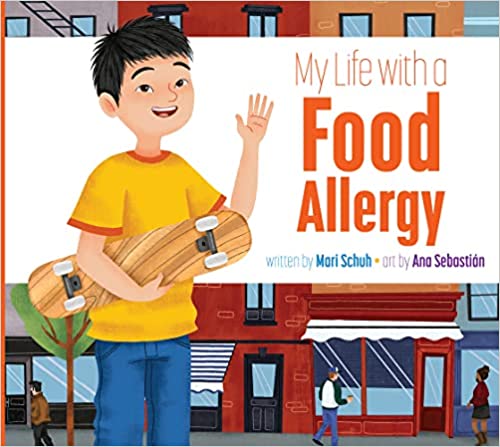
What would life be life without candy bars? Hudson might know because he has a food allergy. Hudson explains what having a food allergy means, what can happen if someone with a food allergy eats food they are allergic to and shows a few foods people are commonly allergic to. He goes on to share his experience discovering he has a tree nut allergy and the steps he takes to avoid having an allergic reaction, including reading food labels in the grocery store, bringing his own food to events, and ensuring adults know he has a food allergy. Although having a food allergy can be hard, Hudson tries to be positive by focusing on the foods he can eat, which helps him see the positive side of things in other aspects of his life. Large, bold illustrations combined with dyslexic-friendly fonts make the story more accessible for young children. Geared towards grades K-3, the short, simple sentences are ideal for reading level two. This non-fiction biography is appropriate for classroom and library curriculum as it provides a glossary of helpful terms, tips for respecting people with food allergies, and additional resources for further exploration. A part of the "My Life With" series, My Life with a Food Allergy provides a good starting point for increasing diversity, promoting inclusion, and may offer an opportunity for children with food allergies to see themselves represented in literature. This is an excellent addition to libraries striving for inclusion and serving younger populations.
The Lupine Award
Barbara Cooney's book Miss Rumphius emphasizes the role each of us can play in making the world a more beautiful place. Inspired by Maine author and illustrator Cooney's book, the Maine Library Association's Youth Services Section Interest Group awards two books the Lupine Award, named after the lupines planted by Miss Rumphius in the book. The Lupine Award has two categories: picture book and juvenile/young adult. The award is given with a focus on Maine, so to be eligible, the book must either focus on Maine through the story's characterization, plot, or setting, or be created by a Maine-living author or illustrator (born or current resident of the state).Winners are usually announced around October 1 each year. For more information, visit Maine Library Association - Lupine Award (mainelibraries.org).
2021 Winners and Honors
Picture Book Winner:The First Blade of Sweetgrass by Suzanne Greenlaw and Gabriel Frey and illustrated by Nancy Baker
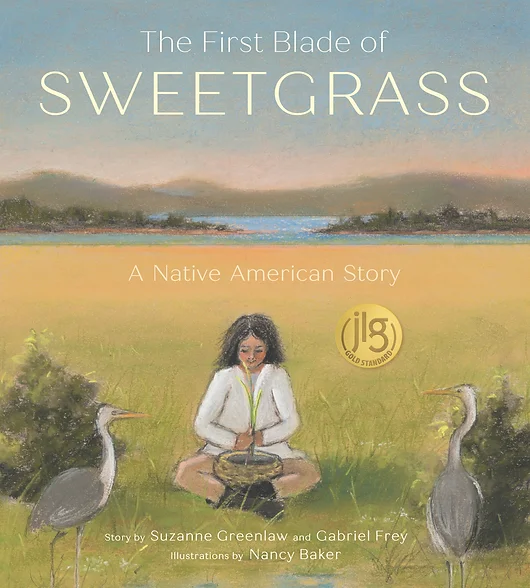
Musquon must overcome her impatience while learning to distinguish sweetgrass from other salt marsh grasses, but slowly the spirit and peace of her surroundings speak to her, and she gathers sweetgrass as her ancestors have done for centuries, leaving the first blade she sees to grow for future generations. This sweet, authentic story from a Maliseet mother and her Passamaquoddy husband includes backmatter about traditional basket making and a Wabanaki glossary.
2021 Winners and Honors
Picture Book Honor: The Little Library by Margaret McNamara and illustrated by G. Brian Karas
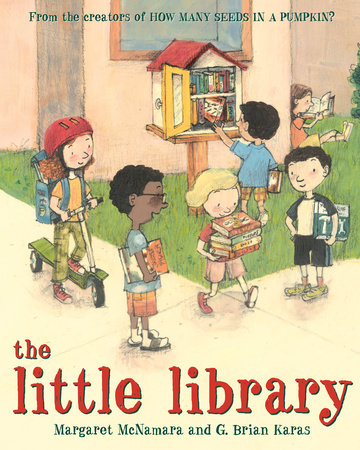
Everyone in Mr. Tiffin's class couldn't be more excited that the new school library has finally opened. Everyone except Jake. Jake is a slow and careful reader. Sometimes he reads the same page more than once to figure everything out. And he often feels left behind on class Library Day. All that changes when Librarian Beck notices Jake running his fingers across the grooves of a brand-new bookshelf and offers him an old, worn book: Woodworking for Young Hands. Jake checks the book out, studies the pictures and instructions, and renews the book again and again. When the school year comes to an end, Jake has the perfect gift idea for the librarian who changed his life--and he makes it with his own two hands.
2021 Winners and Honors
Juvenile/Young Adult Winner: Down to Earth by Betty Culley
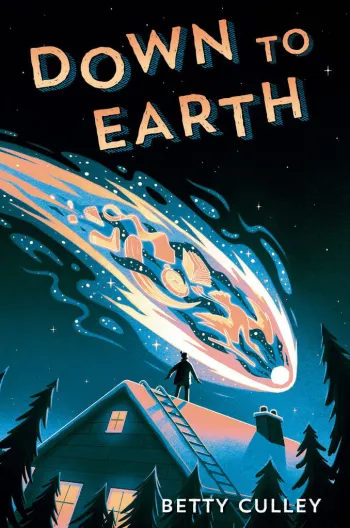
Henry has always been fascinated by rocks. As a homeschooler, he pours through the R volume of the encyclopedia to help him identify the rocks he finds. So, when a meteorite falls in his family's field, who better to investigate than this rock enthusiast–with his best friend, James, and his little sister, Birdie, in tow, of course. But soon after the meteorite's arrival, the water in Henry's small Maine town starts drying up. It's not long before news spreads that the space rock and Henry's family might be to blame. Henry is determined to defend his newest discovery, but his knowledge of geology could not have prepared him for how much this stone from the sky would change his community, his family, and even himself. Science and wonder abound in this middle-grade debut about an inquisitive boy and the massive rock that came down to Earth to reshape his life.
2021 Winners and Honors
Juvenile Young Adult Honor: Franklin Endicott and the Third Key by Kate DiCamillo and illustrated by Chris van Dusen
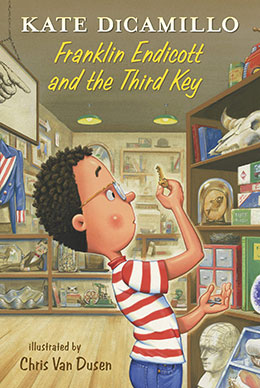
Frank Endicott is a worrier. He worries about lions, submarines, black holes, leprosy, and armadillos. He lists his worries alphabetically in a notebook and suffers vivid nightmares that even a certain neighborhood pig can't dispatch. When he accompanies Eugenia Lincoln on an errand to duplicate a key at her favorite dark and dusty thrift shop, Frank earns fresh cause for alarm. Odd Buddy Lamp, the shop's proprietor, has sent them home with the original key and its copy. Can Frank come to terms with the mystery without buckling under his mounting dread? With a little help from friends (old and new), hot cocoa, and some classic short stories read aloud, the prognosis is good.
★All ChildrensLit Now subscribers were recently sent a survey asking for input and suggestions for future newsletters. This survey was sent through SurveyMonkey, thus possibly arriving in your spam instead of your inbox. No worries! If you have not had a chance to complete the survey, you can access the survey through this link as well: ChildrensLit Now Newsletter Survey Fall 2022 (surveymonkey.com).
★ Children's Literature's parent company, Children's Literature Comprehensive Database (CLCD), offers a free webinar focused on Book Challenges. If you would like to set up a time for this webinar or sign up for a spot on an upcoming date, email ajaygupte@clcd.com.